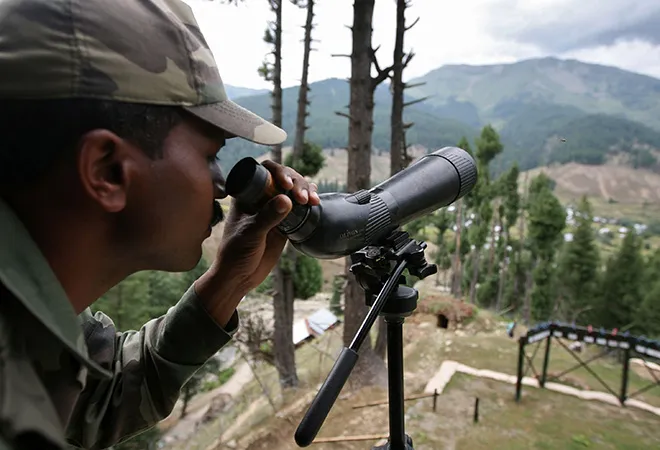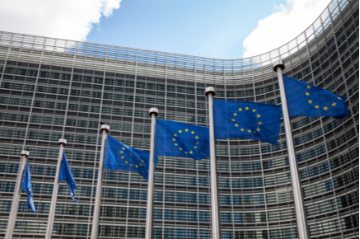
The proposal moved by Union Home Minister Mr. Amit Shah in the Rajya Sabha for the annulment of Article 370 has laid to rest speculations on the intentions of the government following the extraordinary security build up in Jammu & Kashmir (J&K) over the past few weeks. With this, the government has taken a decisive step to radically alter the status quo in the troubled state. While the speculation within the media was about the possible abrogation of Article 35-A, and even the political statements emanating from the Valley warned New Delhi of any such ‘misadventure’, the Modi government, with this decision, has shown the spine to tackle the Kashmir issue by putting the spotlight on an area of core contention. It has also sprung a surprise on the opposition as well as Kashmir’s local political leadership in one fell swoop.
There was a gradual build up to this day. Over past five years the Narendra Modi government made concerted efforts on political, diplomatic and military levels. However, ever since the Modi 2.0 government came to power and Shah was made the Home Minister, speculations were abuzz on the government’s next move. A tough decision, it seemed, was only a matter of time. It started with the security forces going after the terror leadership in the Valley, their local support systems, demonitisation and the governor’s rule. Pakistan, on the other hand, was given clear signals about India’s intensions with the two surgical strikes, while the government managed to earn global support vis-à-vis China on the Masood Azhar issue.
The latest moves – unprecedented infusion of paramilitary forces on the ground, snapping of all modes of communication lines, satellite phones given to key government officials and imposition of Section 144 and the house arrest of key Kashmiri political leaders – indicated that the Modi government had made up its mind to take the proverbial bull by its horn and initiate action on issues hitherto considered as constitutionally-mandated ‘internal matters’ of the state.
This possibly was the best chance New Delhi had to get J&K out of the constitutional constraints and merge it with mainstream Indian society. Back to power with an unprecedented majority, the BJP-led government was in no mood to let this opportunity go away. The turn of events in the Rajya Sabha earlier today has shown the government’s resolution and its swift and determined action on the promise made in the BJP’s Sankalp Patra. However, one can only hope that in their hurry to achieve the larger objective, the Modi-Shah duo will not hurt India’s case in Kashmir and, instead of the proposed integration, give rise to another season of increased violence, reinforce further mistrust and create further divide.
Therefore, it is crucial to understand following four factors:
- Valley politicians will join hands
The Modi government has decimated Srinagar’s political hegemony over the other two regions i.e. Jammu and Ladakh. For a very long time, the Kashmir issue has been dubbed as a political matter that required political solutions. Now that New Delhi has come up with a political solution, the Valley’s arch rivals can be expected to form an alliance against the centre. In the post-Burhan Wani days, the Valley’s politicians leveraged the episodes of terrorist violence, street rage and centre’s policy to deal with the situation. Such rhetoric is bound to now bound to become louder, become intimidatingly anti-India and give Pakistan and its agents a chance to further vitiate the situation in the Valley.
Kashmiri politicians may not be the only channels of communication between New Delhi and the Valley, but within the Valley, they do influence opinions. On the other hand, it is also increasingly felt that the separatists do not represent the voice of the entire state. Given the widespread aversion to the BJP in the Valley, it has been difficult for New Delhi to have an open debate even with the Kashmiri society. Today’s announcement, therefore, will increase this difficulty and deepen the mistrust. It surely won’t serve the cause of either Kashmir or India if the government gives out signals that a so called hard-line ‘Hindu’ party is trying to act tough on Kashmiri Muslims. The last thing the BJP would want is to snap all channels of communications with the Valley at this critical juncture.
- Radicalisation and recruitment will increase
Terrorism in Kashmir is a parasite that has survived on the killings of local Kashmiri boys. It has used every episode in its history of violence to nurture the feeling of hatred, alienation and subjugation among young Kashmiris to breed new terror recruits. From Maqbool Bhat to Afzal Guru to Burhan Wani – every fallen Kashmiri has been eulogised and projected as heroes. While there is no barometer to assess the levels of radicalisation, the figures of terrorists killed in post-Burhan Wani days in the Valley is an indication enough to understand how issues related to the Valley are exploited to further radicalisation. Since the beginning of terrorism in Kashmir; terror masterminds operating from Pakistan, the DGISPR and their supporters in India, have made every effort to stoke more violence in the Valley. In the 1990s, traditional tools were applied to communicate with the Kashmiri society, whereas in the recent past, social media and the internet have been weaponised.
In comparison to the past three years, so far, the current year has relatively remained calm in terms of terrorist violence, encounters and episodes of street rage. However, the political and security developments of past few weeks in the state give an impression that the Valley is on the verge of an unprecedented surge in violence. Until 11.00 am today, the situation of confusion and speculation only instilled fear in the minds of the local population, but with the abrogation of the special status and J&K losing its statehood, India will have to brace itself for newer and deadlier episodes of violence. During 2016-18, various incidents in other parts of India were used to show the alleged subjugation of Muslims and stoke fire in Kashmir. Today’s announcement will be utilised to highlight alleged Hindu rashtravad (Hindu nationalism) and murder of democracy.
For now, the government must focus on controlling the episodes of violence and have a long-term strategy on how the new state of Jammu and Kashmir and Union Territory of Ladakh can be developed and merged with the mainstream India. We must not expect any respite from what has been happening the Valley for past four years. In fact, the terrorist organisations operating in the Valley who are hitherto engaged in a turf war with each other will once again join hands and operate in tandem.
- Chance for Pakistan to internationalise Kashmir
After remaining on the backfoot for a while on the Kashmir issue, finally Islamabad has found an issue with the help of which it can internationalise the matter. On Monday it issued a statement saying it would exercise all possible options to challenge the Indian move to abrogate the special status granted to J&K. This may be nothing more than a lip service to showcase its ‘support’ to the people of Kashmir but must not be neglected.
In post-Burhan Wani days Pakistan’s news factories kept the Kashmir issue afloat at various international platforms and highlighted the alleged human rights violations in Kashmir. A recent report of the Ministry of Defence suggested that Pakistan has been successful in taking Kashmir to global platforms despite efforts to combat the propaganda. All through the past year too, Islamabad orchestrated its international campaign on Kashmir with renewed vigour and tried to exploit alleged human rights violations by Indian forces.
Islamabad has further used its ties with Beijing and Washington to keep afloat the Kashmir issue and keep Indian energies constrained. Over the years, it has also placed itself strategically in line with American interests in South Asia especially in Afghanistan and with Chinese interests in South Asia, particularly, in Pakistan Occupied Kashmir (PoK). It will be interesting to see the positions that Washington and Beijing will take vis-à-vis Islamabad as the situation unfolds in the Valley over the next few days. The latest gaffe by America’s President Donald Trump appeared to be a small diplomatic victory for Pakistani Prime Minister Imran Khan, but the immediate rebuttal by the Indian government followed by this unprecedented move to annul Article 370 has put to rest all debates about international mediation.
The announcement made by Amit Shah in the Rajya Sabha is a step in the right direction and clears the government’s intention of dealing with the Kashmir issue. However, India will have to proceed cautiously and take it further to address the occupied territories.s
The views expressed above belong to the author(s). ORF research and analyses now available on Telegram! Click here to access our curated content — blogs, longforms and interviews.




 PREV
PREV


